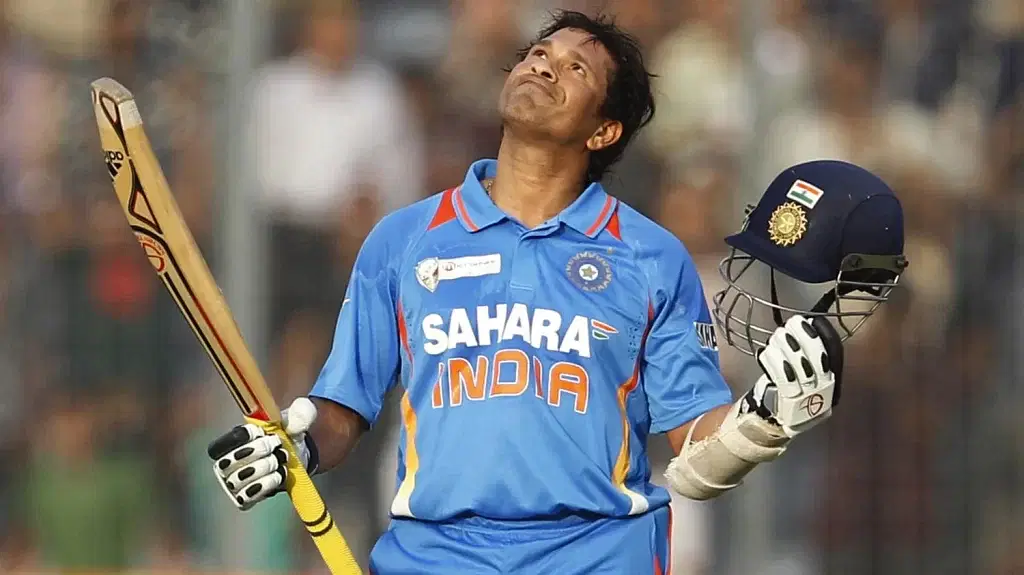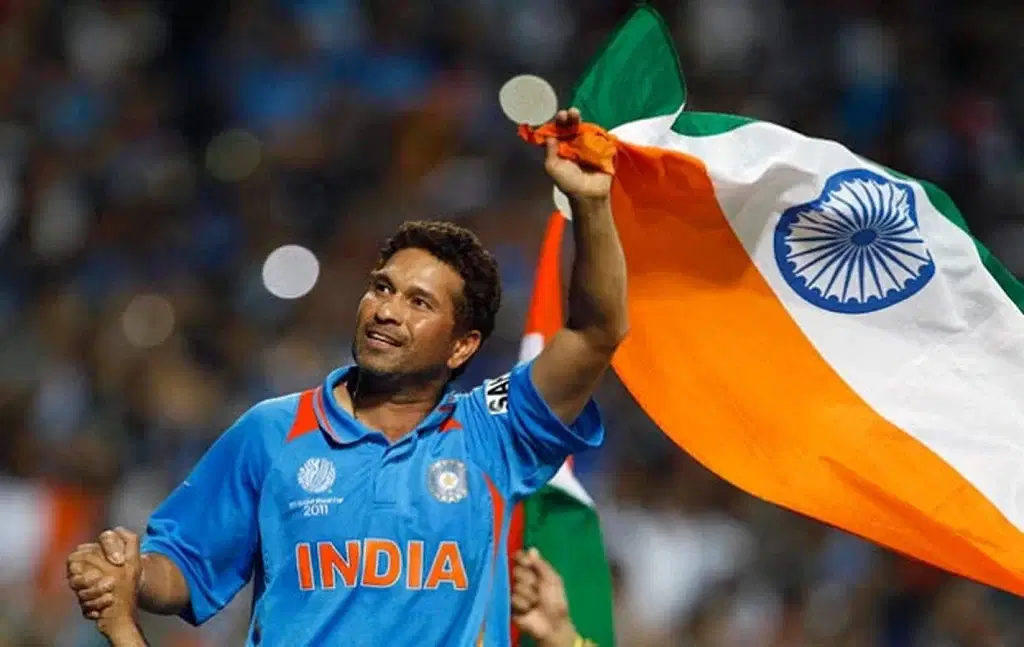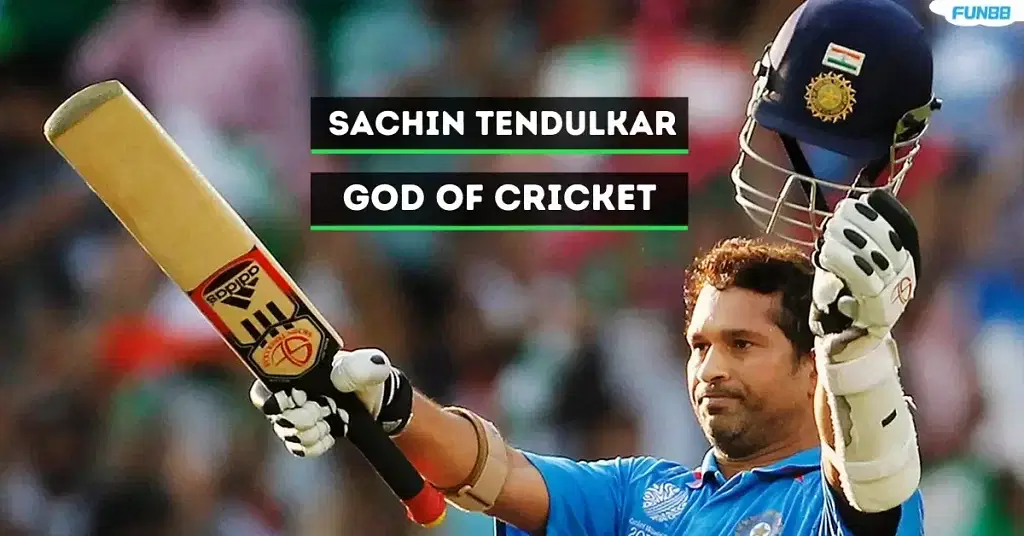Sachin Tendulkar is considered the god of cricket, but many people have different opinions. There is one cricketer who settles all debates and discourses about cricket. That person is Sachin Tendulkar.
Sachin known by various names, such as God of Cricket, Little Master and Master Blaster. He is widely seen among the best batsmen in the annals of cricket. Nevertheless, this piece will look at some accomplishments, records and early days of Sachin, finally answering the question: Who is the God of Cricket?
Who is Sachin Tendulkar?

Sachin Tendulkar was born on April 24th, 1973, in Dadar, Mumbai. His father, Ramesh Tendulkar, was a Marathi poet and novelist, while his mother, Rajni, worked in an insurance company. He has two half-brothers named Nitin and Ajit and a half-sister named Savita.
His initial years were spent in “Sahitya Sahawas Cooperative Housing Society” in Bandra (East) where he went to Sharadashram Vidyamandir High School. Initially, during his school days, he had undergone training at M.R.F Pace Foundation with the hopes of becoming a fast bowler but according to Dennis Lillee, that Australian pace spearhead changed him to a batsman.
Besides playing cricket, Sachin loves tennis, too. Understandably enough for a 14-year-old boy, he made his mark as far back as when he hit a mammoth score of 326 runs in an inter-school game played at Bombay, which resulted in a world record stand with partner Vinod Kambli.
Related Read: Who is the Baap of IPL?
Why is Sachin Called the God of Cricket?
It is widely accepted that Sachin Tendulkar started his cricket journey at the age of 13 when he debuted for the Cricket Club of India. On December 11th, 1988, during a first-class encounter between Mumbai and Gujarat, Tendulkar scored a century without being dismissed, marking the start of a fabulous career.
At only 18 years old, he made several impressive records, including scoring two centuries on the Australia tour: Sydney with 148 runs and Perth with 114 runs. In addition, against West Indies in 1994, he bashed out an amazing tally of 179 runs. In August 1996, at the premature age of 23, Tendulkar became captain of the Indian cricket team.
Then, India faltered in international contests, including a defeat against Australia at the hands of Australia during the 1999 World Cup and losses in series against Australia and South Africa.
His illustrious cricketing career of 24 years ended with his retirement announcement on November 16th, 2013. Later, he retired from playing ODIs in December 2012, while the year ended with a T20 match in the following year. His 200th Test match against West Indies on November 16th, 2013, was the last time he played as an active player.
God of Cricket Sachin Tendulkar Awards and Achievement
| Awards and Achievement | Year |
| Arjuna Award | 1994 |
| Rajiv Gandhi Khel Ratna Award | 1997-1998 |
| Wisden “Cricketer of the Year” | 1997 |
| Padma Shri | 1999 |
| Maharashtra Bhushan Award | 2001 |
| “Player of the Tournament” in the Cricket World Cup | 2003 |
| I.C.C. World O.D.I. XI | 2004 and 2007 |
| “Rajiv Gandhi Award” in the sports category | 2005 |
| Padma Vibhushan | 2008 |
| “Cricketer of the Year” in the I.C.C. Award | 2010 |
| The Asian Awards for the “People’s Choice” and “Exceptional Achievement in Sports” | 2010 (London) |
| “B.C.C.I. Cricketer of the Year” Award | May 31, 2011 |
| The “Castrol Indian Cricketer of the Year” Award | January 28, 2011 |
| Wisden India Outstanding Achievement Award | June 11, 2012 |
| Honorary Member of the Order of Australia by the Australian government | November 6, 2012 |
| Bharat Ratna | 2014 |
| First brand Ambassador of UNICEF for South Asia | November 28, 2013 |
| “Most Influential People in the World” – Time 100 list |
Sachin Tendulkar ODI Cricket Records
ODI Records | Achievements |
| Centuries | The second highest number of centuries (49) |
| The fifties | (96) |
| Most centuries in a calendar year | 9 in 1998 |
| Most fours scored in the career | 2016 times |
| Most stadium appearances | 90 grounds |
| First-person to score a double-century | February 10, 2010 |
| Most Man of the Match awards | 62 |
| Most Man of the Series awards | 15 |
Sachin Tendulkar Test Cricket Records
| Test Records | Achievements |
| Centuries | The highest number of centuries (51) |
| Leading run-scorer | 11,953 |
| Joint-fastest cricketer to reach 10,000 runs in Test cricket with Brian Lara | |
| 1000+ Test runs in calendar years | 6 times – 1997, 1999, 2001, 2002, 2008, 2010 |
| Only player in the world to have scored 5 Test centuries before turning 20 |
Why Sachin Tendulkar is the God of Cricket?

Sachin Tendulkar’s fame rests not only on his being an extraordinary player but also on his incredible sportsmanship. When it came to the game, he revered it, worked hard, and always behaved well, whether on the pitch or off it. This proved that one needed to be a good human being first, and then sports could follow.
Additionally, no wonder there has been a generation of cricketers who dreamt about playing like him since he is like the current Virat Kohli today; this is something that players like Kohli will never accept as they owe their entire careers to Sachin’s decision to dedicate his life towards cricket instead of going for another career path.
Very few people in sports have had the impact he has had on cricket in India and globally. Furthermore, his induction into the International Cricket Council Hall of Fame cemented Tendulkar’s legacy again in 2019.
The Best vs. Very Best
Known affectionately as the God of Cricket, Tendulkar’s journey is a testament to his ability to perform against the strongest adversaries. His cricketing career, unfolding over 24 illustrious years, consistently saw him confront and overcome the best bowlers of each era.
From the blistering pace of Australia’s Brett Lee to the guile of Pakistan’s Wasim Akram, Tendulkar’s technique and temperament were formidable. One standout feature of Tendulkar’s batting was his adaptability across conditions. Playing against the world’s elite meant negotiating not just individual skills but adapting to varied pitch conditions—from the bouncy tracks in Perth to the swinging wickets at Trent Bridge.
During the 1999 Test series against Australia, often dominated by the fierce bowling of Shane Warne, Tendulkar’s resilience and strategic mastery stood out. His century at Chennai, playing Warne on a turning track was an inning that has since become a classic case of attacking spin with calculated aggression.
Tendulkar’s illustrious career is enriched by more than just statistics, though they are impressive in their own right; 51 Test centuries and 49 ODI centuries embody his relentless consistency.
But his ability to produce jaw-dropping performances under pressure sets him apart and justifies his reverence as the God of Cricket.
Shining on the Big Stage
Beyond the challenging task of facing cricketing greats, Tendulkar had an uncanny ability to shine during cricket’s grandest spectacles. In World Cup tournaments, his performances were nothing short of extraordinary, ensuring his place in cricket history. The 2003 World Cup was a definitive moment where Tendulkar’s brilliance was indisputable.
He amassed 673 runs, leading India to the finals, including an iconic inning against Pakistan, where he masterfully dominated their formidable bowling attack.
Playing on such a platform often brings unimaginable pressure, yet Tendulkar thrived. During India’s historic Test series against England at the Lord’s Cricket Ground, often called the “Home of Cricket,” Sachin’s batting was a masterclass in technique and temperament. His innings at difficult venues demonstrated how he met challenges head-on and often dictated terms to the opposition, turning venues into theatres of his art.
Tendulkar’s journey wasn’t merely about personal records. His role also defined it as a beacon of hope and inspiration for generations of cricketers both in India and globally.
His innings weren’t just battles won on the field; they were lesson plans on how to withstand pressure and craft an unforgettable narrative. Off the field, his humility and dedication made him a role model. His influence stretched beyond just his teammates, impacting aspiring cricketers who grew up watching his performances.What truly cements his legacy as the God of Cricket is the holistic impact he had on the game—by blending skill with sportsmanship, by rallying a nation around him whenever he took to the crease, and by rewriting the script of what it means to be a modern cricket legend. Sachin Tendulkar’s career is a beautiful montage of moments that captivate, inspire, and will eternally be commemorated as part of cricket’s rich lore.
Star it if you find it helpful.

